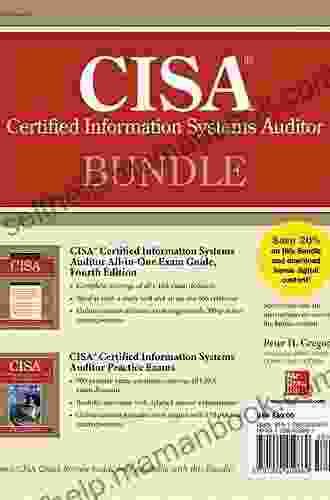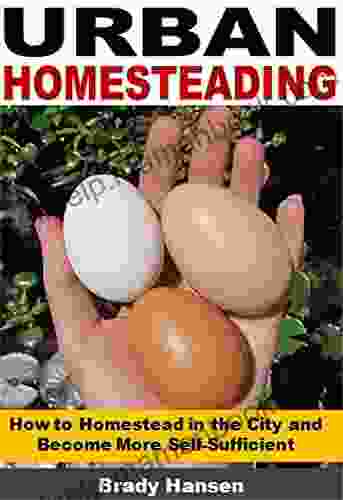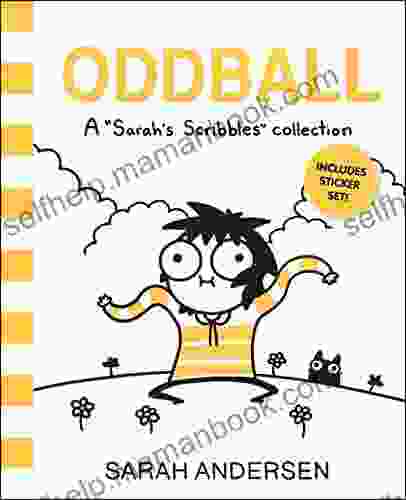Homesteading in the City: A Guide to Self-Sufficiency in Urban Environments

As the global population continues to urbanize, the concept of homesteading has taken on a new meaning. Homesteading, once associated with vast tracts of rural land, is now becoming increasingly popular in cities. Urban homesteading involves creating a self-sufficient lifestyle within the confines of the city, utilizing limited space and resources. This article provides a comprehensive guide to homesteading in the city, empowering individuals to become more self-reliant and live a more sustainable life amidst the urban landscape.
Benefits of Urban Homesteading
Urban homesteading offers a host of benefits that contribute to a more fulfilling and sustainable lifestyle. Some of the key advantages include:
4 out of 5
| Language | : | English |
| File size | : | 155 KB |
| Text-to-Speech | : | Enabled |
| Enhanced typesetting | : | Enabled |
| Print length | : | 14 pages |
| Lending | : | Enabled |
| Screen Reader | : | Supported |
- Increased self-sufficiency: By producing your own food, generating energy, and managing waste, you reduce your reliance on external resources and become more independent.
- Reduced environmental impact: Urban homesteading promotes sustainable practices that minimize waste, conserve energy, and reduce carbon emissions.
- Improved health and well-being: Growing your own food ensures access to fresh, nutritious produce while engaging in physical activities associated with homesteading contributes to overall well-being.
- Community building: Urban homesteading fosters a sense of community by connecting neighbors through shared interests in sustainability and self-reliance.
- Personal satisfaction: The process of creating a self-sufficient homestead can bring a deep sense of accomplishment and fulfillment.
Getting Started with Urban Homesteading
Embarking on an urban homesteading journey requires a combination of planning, resourcefulness, and a willingness to embrace sustainable living. Here are some key steps to get started:
- Assess your space: Determine the square footage and outdoor areas available to you. This will help you plan the scale and scope of your homesteading efforts.
- Identify your interests: Consider what aspects of homesteading you are most passionate about, whether it's gardening, energy generation, or waste management.
- Research and learn: Gather information through books, online resources, workshops, and local homesteading groups. Knowledge is essential for success.
- Start small: Begin with manageable projects, such as growing herbs on a windowsill or composting kitchen scraps. Gradually expand your efforts as you gain experience.
- Connect with neighbors: Share your homesteading plans with neighbors and seek opportunities to collaborate or share resources.
Urban Gardening: Growing Your Own Food
Food production is a cornerstone of urban homesteading. Here are some tips for successful gardening in limited spaces:
- Vertical gardening: Utilize vertical space by growing plants on trellises, containers, or hanging baskets.
- Container gardening: Grow vegetables, herbs, and small fruits in pots and containers on balconies, patios, or rooftops.
- Community gardening: Join or start a community garden to share resources, knowledge, and space with like-minded individuals.
- Rooftop gardening: If you have access to a rooftop, consider creating a rooftop garden to maximize sunlight exposure.
- Hydroponics and aeroponics: Explore soil-less gardening techniques that allow you to grow plants vertically and conserve water.
Energy Generation: Powering Your Homestead
Reducing reliance on external energy sources is essential for self-sufficiency. Here are some options for generating energy in urban environments:
- Solar panels: Install solar panels on rooftops, balconies, or even windowsills to harness sunlight for electricity.
- Wind turbines: If you have a suitable outdoor space, consider installing a small wind turbine to generate renewable energy.
- Biodiesel: Convert used cooking oil into biodiesel to power vehicles or generators.
- Passive solar design: Design your home or apartment to take advantage of natural sunlight for heating and cooling.
- Energy efficiency: Implement energy-efficient appliances, lighting, and insulation to reduce energy consumption.
Waste Management: Reducing Your Footprint
Waste management is a crucial aspect of urban homesteading. Here are some strategies to reduce your waste footprint:
- Composting: Create a compost bin or use a composting system to turn organic waste into nutrient-rich soil for your garden.
- Recycling: Sort and recycle paper, plastic, glass, and metal to divert waste from landfills.
- Upcycling and reuse: Find creative ways to reuse and repurpose items, such as turning old clothes into rags or using jars for storage.
- Waste minimization: Reduce waste by buying in bulk, choosing reusable products, and avoiding single-use plastics.
- Community cleanups: Participate in organized cleanup events to reduce litter and improve the environment in your neighborhood.
Legal Considerations and Resources
Before embarking on urban homesteading, it's essential to be aware of any legal restrictions or regulations that may apply in your city. Here are some tips:
- Check local ordinances: Review city ordinances related to gardening, composting, and solar energy systems to ensure compliance.
- Secure permits: Obtain necessary permits for installing solar panels, wind turbines, or other structures on your property.
- Join local homesteading groups: Connect with other urban homesteaders to share experiences, resources, and legal advice.
- Educate your neighbors: Inform your neighbors about your homesteading efforts to avoid misunderstandings or concerns.
- Be respectful of community spaces: Avoid using public areas for gardening or composting without proper authorization.
Homesteading in the city is an empowering and rewarding endeavor that allows individuals to live more self-sufficiently while contributing to a sustainable urban environment. By embracing sustainable practices, utilizing limited space, and connecting with neighbors, urban homesteaders can create a life of greater independence, well-being, and environmental stewardship. As urban populations continue to grow, homesteading will become increasingly important as a way to reduce our reliance on external resources and create more resilient, sustainable cities.
4 out of 5
| Language | : | English |
| File size | : | 155 KB |
| Text-to-Speech | : | Enabled |
| Enhanced typesetting | : | Enabled |
| Print length | : | 14 pages |
| Lending | : | Enabled |
| Screen Reader | : | Supported |
Do you want to contribute by writing guest posts on this blog?
Please contact us and send us a resume of previous articles that you have written.
 Top Book
Top Book Novel
Novel Fiction
Fiction Nonfiction
Nonfiction Literature
Literature Paperback
Paperback Hardcover
Hardcover E-book
E-book Audiobook
Audiobook Bestseller
Bestseller Classic
Classic Mystery
Mystery Thriller
Thriller Romance
Romance Fantasy
Fantasy Science Fiction
Science Fiction Biography
Biography Memoir
Memoir Autobiography
Autobiography Poetry
Poetry Drama
Drama Historical Fiction
Historical Fiction Self-help
Self-help Young Adult
Young Adult Childrens Books
Childrens Books Graphic Novel
Graphic Novel Anthology
Anthology Series
Series Encyclopedia
Encyclopedia Reference
Reference Guidebook
Guidebook Textbook
Textbook Workbook
Workbook Journal
Journal Diary
Diary Manuscript
Manuscript Folio
Folio Pulp Fiction
Pulp Fiction Short Stories
Short Stories Fairy Tales
Fairy Tales Fables
Fables Mythology
Mythology Philosophy
Philosophy Religion
Religion Spirituality
Spirituality Essays
Essays Critique
Critique Commentary
Commentary Glossary
Glossary Bibliography
Bibliography Index
Index Table of Contents
Table of Contents Preface
Preface Introduction
Introduction Foreword
Foreword Afterword
Afterword Appendices
Appendices Annotations
Annotations Footnotes
Footnotes Epilogue
Epilogue Prologue
Prologue Lily Lovell
Lily Lovell Mark Yakich
Mark Yakich I R Wright
I R Wright Andy Dunn
Andy Dunn Maria Dahvana Headley
Maria Dahvana Headley Georg Ebers
Georg Ebers Poetry Live
Poetry Live Theodor Morten
Theodor Morten Jess Lourey
Jess Lourey Chor Pee Lim
Chor Pee Lim Sigmund Brouwer
Sigmund Brouwer Stu Jones
Stu Jones Melanie Harlow
Melanie Harlow Katharine Ellis
Katharine Ellis Octave Mirbeau
Octave Mirbeau Zachary Mahnke
Zachary Mahnke John Etzil
John Etzil Juan De Mena
Juan De Mena Ambrose Bierce
Ambrose Bierce Dave Barry
Dave Barry
Light bulbAdvertise smarter! Our strategic ad space ensures maximum exposure. Reserve your spot today!

 Robert ReedThe Very Strange Day Ann Nocenti Woke Up and Found Herself Trapped in Her Own...
Robert ReedThe Very Strange Day Ann Nocenti Woke Up and Found Herself Trapped in Her Own... Paul ReedFollow ·16.5k
Paul ReedFollow ·16.5k Herb SimmonsFollow ·4k
Herb SimmonsFollow ·4k Jayden CoxFollow ·16.5k
Jayden CoxFollow ·16.5k Greg FosterFollow ·9.6k
Greg FosterFollow ·9.6k Ira CoxFollow ·11.9k
Ira CoxFollow ·11.9k Heath PowellFollow ·5.6k
Heath PowellFollow ·5.6k Carson BlairFollow ·5.2k
Carson BlairFollow ·5.2k Dakota PowellFollow ·11.1k
Dakota PowellFollow ·11.1k

 Boris Pasternak
Boris PasternakThe Misted Mirror: Mindfulness for Schools and...
What is The Misted...

 Holden Bell
Holden BellEmbark on Thrilling Adventures in the Uncharted Depths of...
Unveiling the Enchanting...

 Seth Hayes
Seth HayesDelphi Complete Works of Lucan: Illustrated Delphi...
This meticulously edited...

 Jackson Hayes
Jackson HayesThe Enigmatic Cat Burglar: Unraveling the Intriguing...
In the annals of crime, the name Bernie...

 Quentin Powell
Quentin PowellAligned With The Cisa Review Manual 2024 To Help You...
The CISA Review Manual 2024 is the most...

 Austin Ford
Austin FordUnlocking Revenue Potential: A Comprehensive Business...
In today's digital...
4 out of 5
| Language | : | English |
| File size | : | 155 KB |
| Text-to-Speech | : | Enabled |
| Enhanced typesetting | : | Enabled |
| Print length | : | 14 pages |
| Lending | : | Enabled |
| Screen Reader | : | Supported |










